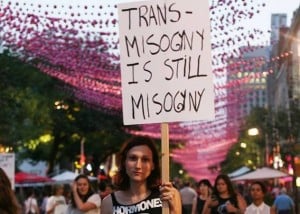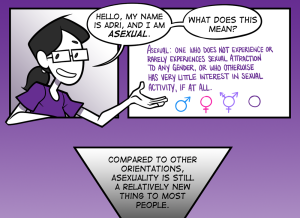If you’ve been (or are) closeted, you’re already aware that it’s not that fun.
There’s a reason we call it being “in the closet” and not “in the spacious two bedroom loft with high ceilings”: Hiding your sexual orientation and/or gender identity from others can be a confining, isolating experience.
Having to hear what your (not so progressive) friends and family say about LGBTQIA+ people when they think there aren’t any around. Wanting to date without wearing a sign on your forehead that says “available for same gender loving.” Having that one person who managed to discover your identity threaten to out you to the people you never wanted to come out to. Living a partial life or an all-out lie.
And the list could go on.
And what’s worse, being in the closet isn’t really a choice.
No one would catch a glimpse of a beautifully diverse and accepting world and choose to hide in a closet.
People are closeted because they feel that it shields them from some of the bullying, rejection, violence, and discrimination still common in the wider world.
But for many of us, being in the closet also brings with it a sense of security. And that feeling of security can make it hard to see the small ways that being closeted can take a toll on your mental well-being.
Though there’s no one-size-fits-all way to deal with the stress of being in the closet, especially since there are so many situations that put people there, there are some things that can ease the burden or keep it from getting heavier than it already is.
1. Carve Out Spaces to Be Authentic
One of the more obvious ways to do this is to seek out an organization, group, or online forum for LGBTQIA+ people.
Here’s a non-comprehensive, international list of organizationsand groups that cater to queer folks.
When you’re in a truly safe space, it can be something of a relief to put your “someone might say something transphobic/homophobic/otherwise crappy to my face” defenses down.
But that’s not entirely what I mean by carving out spaces to be authentic.
I also mean finding ways, big or small, to be as completely and wholly yourself as you can be regardless of what’s going on around you.
Do something you love that feels effortless to you — cook amazing food, eat junky food, write for hours on end, read lesbian erotica if that’s what you’re into, have a pointless conversation with your best friend, paint the things you can’t say, run, play video games.
Whatever you could possibly do that doesn’t require you to wear a mask or watch your back, make time to do it.
This sounds easy, but it really isn’t.
Have you ever had a moment, right before you go to sleep, where you realize how needlessly tense your body is? Your body is so used to responding to the normal stressors of everyday life that it takes awareness to notice tense muscles and relax them.
It’s just as easy to carry the tension and stress of being in the closet into spaces that should be free and enjoyable.
I remember sitting down to write in a more closeted time of my life and feeling like there was someone looking over my shoulder, preparing to condemn my words.
I was so used to being anxious about being judged or “found out” that I didn’t know how to relax in the very space I created to escape that fear.
Letting that go meant remembering that it was my space – meaning I could be as queer, weird, unworthy, amazing, or boring as I allowed myself to be.
If you can, make yourself a space.
Break some walls down. Do what you need to have some area of your life that is truly yours to be real in.
It’s possible to survive without making a space for yourself, and there are people for whom it really isn’t feasible.
But when it can be done, it can give you a break from the at times defensive, precarious task of staying in the closet.
2. Others’ Hostility Is Not Your Problem
Something good to keep in mind while in the closet is that other people’s feelings about your sexual orientation or gender identity, or LGBTQIA+ people in general, aren’t really your problem.
In other words, it’s not your job to stay in the closet to protect other people from your icky, scary identity. If anything, being in the closet can sometimes protect you from their icky, scary bigotry.
Your sexual or gender identity is not a selfish choice, disgusting, abnormal, confusing, an abomination, or any of the other things people say to shame LGBTQIA+ people into hiding.
So when you catch yourself internalizing that shame (which can happen to the best of us), challenge it.
Catch yourself joining in on or subconsciously believing homophobic or transphobic banter. Catch yourself feeling apologetic when your relatives talk up the big, straight wedding you don’t plan on having. Catch yourself believing that in some way, you’ve deviated from the norm and deserve to feel bad about it.
Challenge those beliefs.
They’re untrue.
You’re probably awesome, and even if you’re not (or don’t believe yourself to be), your sexual orientation and gender don’t affect your level of awesomeness.
3. Coming Out Is Not an Obligation
On the other side of the coin, you can feel shame or be shamed for not being ready to come out.
Yes, when talented, successful people we look up to come out, it can be a source of comfort and hope for us and coming generations.
But if those talented, successful people had the good fortune of being able to come out on their own time, they likely weighed their decision against a range of factors — their ability to maintain relationships, make money, stay safe, and so on.
Everyone has to make that assessment for themselves, and if you at any time feel that coming out is not worth the potential risk to your safety or livelihood, you’re not obligated to.
You’re also no less “brave” than the most outspoken LGBTQIA+ people in the world.
The most outspoken queer people in the world probably spent some part of their lives either in the closet or under the radar while they built their careers enough to feel secure in being fully, publically out.
I’m not trying to minimize the amount of internal work, self-awareness, and fearlessness that coming out under hostile circumstances can take. It’s no joke.
But neither is remaining in the closet when there is still discrimination against LGBTQIA+ people.
There’s no shame in being where you are right now.
4. People Might Surprise You – Or Not
Also keep in mind that though your reasons for staying in the closet are legitimate, they aren’t predictive of what would actually happen if you came out.
It’s impossible to know how people will react to every coming out situation.
If you come out (which usually isn’t a onetime thing), some people will disappoint you, some will pleasantly surprise you, some will say they already knew, some will somehow forget you came out the first time, and the list of possible reactions goes on.
Spending time and energy while you’re in the closet worrying about what happens when you step out of it is an added and unnecessary stress.
You can’t read all the minds or review all of the scenarios to prepare yourself for what could happen, good or bad.
You can, however, keep yourself open to the possibility of things going better or worse than you expect them to.
And in either situation, you can adapt.
***
All that being said, the stress of being in the closet is no different from any other stressor in your life.
You’re in the best position to know what works, what doesn’t, and what inner resources you have for keeping yourself balanced.
If you’ve ever managed the stress of being in the closet, what’s proven most helpful for you?
[do_widget id=‘text-101′]
Jarune Uwujaren is a Contributing Writer for Everyday Feminism. A Nigerian-American recent graduate who’s stumbling towards a career in writing, Jarune can currently be found drifting around the DC metro area with a phone or a laptop nearby. When not writing for fun or profit, Jarune enjoys food, fresh air, good books, drawing, poetry, and sci-fi. Read their articles here.
Search our 3000+ articles!
Read our articles about:
Our online racial justice training
Used by hundreds of universities, non-profits, and businesses.
Click to learn more





















